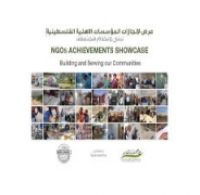
PNGO III is a 10USD million project supported by the Bank during 2006 to 2011. The project grant recipient is the Welfare Association, who had delegated the implementation of the project to the NGO development Center (NDC).
Two key achievements include (i) the development of an NGO Code of Conduct, which is the first of its kind in the Region and is recognized as a model, and (ii) delivery of social services, complementary to the PA, in an efficient and effect way to Palestinians in the West Bank, E. Jerusalem and Gaza.
The PNGO III Closing Ceremony
|
The PNGO III closing ceremony event was held under the auspices of his Excellency Prime Minister Salam Fayyad and was organized by the World Bank and the NGO Development Center (NDC) in collaboration with the Welfare Association. The four hour event featured opening speeches by the key partners .
|
|
Furthermore, a mini showcase, using booths, was set up to enable participating NGO to exhibit and showcase their projects, discuss their experiences with PNGO with visiting guests and provide a platform for networking and fostering dialogue between the public , private and civil society.
Main objectives of the Closing Ceremony:
-
To showcase and highlight the work of PNGO III and its added value from the perspective of the beneficiary NGOs. The participating NGOs demonstrated their achievements and successes in fulfilling their missions towards their local communities and the beneficiaries they serve. Each participating / exhibiting NGO was provided with a table to display their products and services. In addition, the organizers also prepared summary fact sheets for each NGO highlighting the project/s they worked on under PNGO III.
-
To promote NDC in helping NGOs and the NGO sector in fulfilling their vital role in the development process in the West Bank, including East Jerusalem and Gaza, and in raising awareness on the complementary roles of all sectors (public, private and the NGO sector) in addressing the needs of the Palestinian communities.
-
To help foster dialogue among the three sectors and build synergies and cooperation between PA institutions and the NGO sector.
Event Fact & Figures:
|
Date: June 22nd 2011 Time: 10:00 am – 02:00 pm Venue: Red Crescent Building, Al Bireh Palestine Exhibitors: a total of 42 exhibitors from across Jerusalem and the West Bank (27 main NGOs and 15 CBO-under mentoring program)
|
|
Represented Sector: A wide range of projects and sector were represented at the event including; health, culture, education , social services, women, youth, special needs, environmental awareness, water, agriculture, and more.
Attendees: Special invitation were sent out to key people and organizations in addition to an open invitation to the general public that was publicized in the local newspapers and on selected radio stations. Nearly 200 people attended the closing ceremony.
Speaker highlights:
|
Dr. Salam Fayyad, Prime Minister: “Today, we are celebrating the accomplishments of the civil society that richly contributes to supporting the solidarity of the people to stay in their land. We have always worked towards enhancing our relationship with these organizations as we believe in the complementary role they play on our way to build an independent Palestinian state.” said Prime Minister Salam Fayyad in his speech at the ceremony. |
|
|
Mariam Sherman, World Bank Country Director for West Bank and Gaza Strip: “The role of civil society in a well functioning state is well understood– it can provide a link between citizens and the state and act as a check on bureaucracies. In service delivery, NGOs can serve to amplify the voice of the most needy citizens and play a role in monitoring service delivery. Palestinian NGOs, as a key part of civil society, have a history of providing valuable basic services to those who need them most”
|
|
|
Mr. Zahi Khouri, Chairman of the Board, NDC: highlighted the role that civil society, and its organizations, plays towards building a Palestinian state. “Perhaps the most prominent success in this context was the broad based consultations that NDC conducted towards developing the Code of Conduct for Palestinian NGOs. On the day of its launch back in 2008; 570 NGOs voluntarily signed the Code of Conduct.”
|
|
|
Dr. Rana Khatib, Director of Research & planning, Welfare Association: “Establishing this center [NDC] and supporting and developing it throughout the previous phases was indeed something to be proud of for the Welfare Association. PNGOIII is part of its main focus to continue supporting the Palestinian public in different sectors; through development programs and projects directed to satisfy the needs of the majority in the Palestinian community.”
|
|
NGO Voices on PNGO III
Nearly all the exhibiting NGOs expressed their appreciation both for the PNGO III project as a whole and for the staging the closing ceremony event. With regards to the closing ceremony, main feedback included:
-
Some exhibitors would have liked to play a more active role in the event (ie. Being able to present their projects / experience to the audience as a whole).
-
Some were disappointed that the key speakers did not walk around the exhibition area to meet the exhibitors and get a quick introduction / briefing.
-
Participant were excited to participate and have the opportunity to network with visitors as well as among exhibiting NGOs. Other were happy to get the opportunity to meet more staff from the NDC (besides the program officers).
-
The fact sheets that were produced were a good idea and were handed out to the event visitors as well to other stakeholders who did not attend the event.






